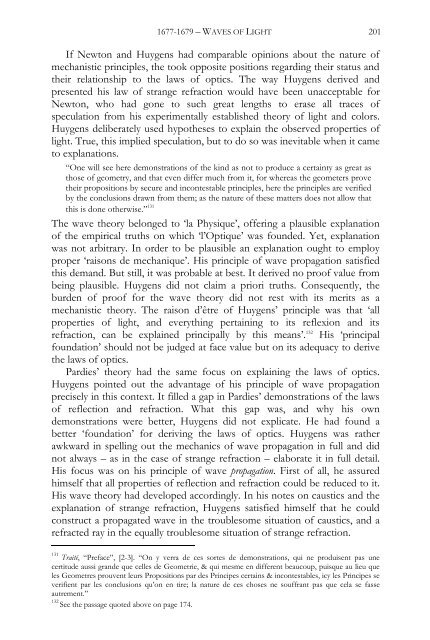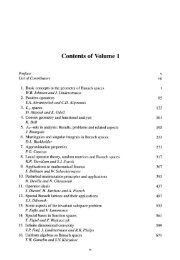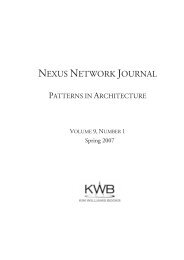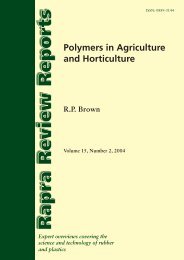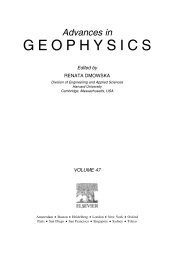Lenses and Waves
Lenses and Waves
Lenses and Waves
Create successful ePaper yourself
Turn your PDF publications into a flip-book with our unique Google optimized e-Paper software.
1677-1679 –WAVES OF LIGHT 201<br />
If Newton <strong>and</strong> Huygens had comparable opinions about the nature of<br />
mechanistic principles, the took opposite positions regarding their status <strong>and</strong><br />
their relationship to the laws of optics. The way Huygens derived <strong>and</strong><br />
presented his law of strange refraction would have been unacceptable for<br />
Newton, who had gone to such great lengths to erase all traces of<br />
speculation from his experimentally established theory of light <strong>and</strong> colors.<br />
Huygens deliberately used hypotheses to explain the observed properties of<br />
light. True, this implied speculation, but to do so was inevitable when it came<br />
to explanations.<br />
“One will see here demonstrations of the kind as not to produce a certainty as great as<br />
those of geometry, <strong>and</strong> that even differ much from it, for whereas the geometers prove<br />
their propositions by secure <strong>and</strong> incontestable principles, here the principles are verified<br />
by the conclusions drawn from them; as the nature of these matters does not allow that<br />
this is done otherwise.” 131<br />
The wave theory belonged to ‘la Physique’, offering a plausible explanation<br />
of the empirical truths on which ‘l’Optique’ was founded. Yet, explanation<br />
was not arbitrary. In order to be plausible an explanation ought to employ<br />
proper ‘raisons de mechanique’. His principle of wave propagation satisfied<br />
this dem<strong>and</strong>. But still, it was probable at best. It derived no proof value from<br />
being plausible. Huygens did not claim a priori truths. Consequently, the<br />
burden of proof for the wave theory did not rest with its merits as a<br />
mechanistic theory. The raison d’être of Huygens’ principle was that ‘all<br />
properties of light, <strong>and</strong> everything pertaining to its reflexion <strong>and</strong> its<br />
refraction, can be explained principally by this means’. 132 His ‘principal<br />
foundation’ should not be judged at face value but on its adequacy to derive<br />
the laws of optics.<br />
Pardies’ theory had the same focus on explaining the laws of optics.<br />
Huygens pointed out the advantage of his principle of wave propagation<br />
precisely in this context. It filled a gap in Pardies’ demonstrations of the laws<br />
of reflection <strong>and</strong> refraction. What this gap was, <strong>and</strong> why his own<br />
demonstrations were better, Huygens did not explicate. He had found a<br />
better ‘foundation’ for deriving the laws of optics. Huygens was rather<br />
awkward in spelling out the mechanics of wave propagation in full <strong>and</strong> did<br />
not always – as in the case of strange refraction – elaborate it in full detail.<br />
His focus was on his principle of wave propagation. First of all, he assured<br />
himself that all properties of reflection <strong>and</strong> refraction could be reduced to it.<br />
His wave theory had developed accordingly. In his notes on caustics <strong>and</strong> the<br />
explanation of strange refraction, Huygens satisfied himself that he could<br />
construct a propagated wave in the troublesome situation of caustics, <strong>and</strong> a<br />
refracted ray in the equally troublesome situation of strange refraction.<br />
131 Traité, “Preface”, [2-3]. “On y verra de ces sortes de demonstrations, qui ne produisent pas une<br />
certitude aussi gr<strong>and</strong>e que celles de Geometrie, & qui mesme en different beaucoup, puisque au lieu que<br />
les Geometres prouvent leurs Propositions par des Principes certains & incontestables, icy les Principes se<br />
verifient par les conclusions qu’on en tire; la nature de ces choses ne souffrant pas que cela se fasse<br />
autrement.”<br />
132 See the passage quoted above on page 174.


